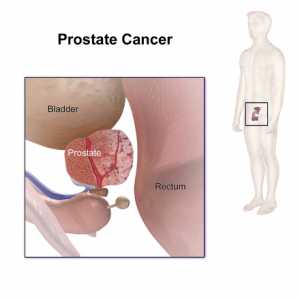
22 Sep High-Risk Gleason 5 Prostate Cancers Not Resistant to Androgen Deprivation Therapy
MedicalResearch.com Interview with:
Amar U. Kishan, MD
Assistant Professor
Department of Radiation Oncology
University of California, Los Angeles
MedicalResearch.com: What is the background for this study? What are the main findings?
Response: Three large randomized trials demonstrated an overall survival (OS) benefit when androgen deprivation therapy (ADT) is combined with radiotherapy (RT) for high-risk prostate cancer (PCa). The duration of ADT in these seminal studies ranged from six months to lifelong. Because ADT has multiple attendant adverse effects–including bone loss, altered metabolism, diminished muscle mass, gynecomastia, hot flashes, and possibly increased cardiovascular events–shortening the duration of ADT without compromising oncologic effectiveness has been an area of active study. Five trials have compared various durations of ADT, reaching conflicting conclusions with respect to overall survival outcomes, with some suggesting an improvement with longer durations of ADT and others failing to show a uniform survival benefit.
Most of these trials have amalgamated Gleason grade group 4 (Gleason score 8) PCa with Gleason grade group (GG) 5 (Gleason score 9-10) PCa. Emerging data indicate that GS 9-10 PCa constitutes a distinct subset of high-risk PCa with inferior outcomes and earlier progression than GS 8 disease. With the knowledge that GS 9-10 PCas constitute a distinct, more aggressive form of PCa, one might hypothesize that longer durations of ADT may be more advantageous in both augmenting local control and controlling potential micrometastatic disease. Alternatively, as GS 9-10 lesions by definition contain highly de-differentiated Gleason pattern 5 disease foci and may proceed to a castrate-resistant state more rapidly, one may also hypothesize that GS 9-10 lesions are less responsive to ADT, and longer durations may be counter-productive.
In order to identify differences in the impact of ADT duration on clinical outcomes of patients with GG 4 and GG 5 PCa, we performed an individual patient-level meta-analysis of six randomized trials. Our working hypothesis was that longer durations of ADT would offer significant survival benefits in both groups.
MedicalResearch.com: What are the main findings?
Response: We had two major findings.
First, we independently identified, in a prospectively-treated sample of patients, that GG 5 tumors portend worse clinical outcomes than GG 4 tumors.
Second, and more importantly, we found that the response to androgen deprivation therapy was different between GG 4 and GG 5 tumors, with the latter actually benefiting more from longer durations of ADT. Interestingly, the survival differences between GG 4 and GG 5 tumors disappeared with longer durations of ADT. Thus, GG 5 tumors are not inherently resistant to androgen deprivation therapy. In fact, ADT is particularly effective against them.
MedicalResearch.com: What should readers take away from your report?
Response: There are two key take-aways. First, GG 5 and GG 4 tumors clearly have a different natural history, and different response to systemic therapy. It may not be appropriate to simply lump all GG 4 and GG 5 together as having “high-risk disease” under one umbrella for treatment strategies.
Second, GG 5 disease is not inherently resistant to ADT and in fact .androgen deprivation therapy is critical in treating GG 5 disease.
MedicalResearch.com: What recommendations do you have for future research as a result of this work?
Response: The finding that lifelong ADT is most effective in GG 5 disease may suggest that micrometastatic disease is present and must be controlled with ADT. However, that is nihilistic and doesn’t appear to be consistent with other data that suggest that escalation of local therapy may be important in these patients (including our own data). Therefore, there are two key avenues of research we would like to pursue. First would be to identify whether increased potency ADT agents could be used to shorten the duration of ADT, while maintaining efficacy. Second would be to rigorously analyze the data with an eye towards identifying whether late local failures might lead to adverse cancer outcomes as well (which would underscore the importance of local control upfront, even in a disease with a high propensity towards metastatic spread).
Citation:
[wysija_form id=”3″]
[last-modified]
The information on MedicalResearch.com is provided for educational purposes only, and is in no way intended to diagnose, cure, or treat any medical or other condition. Always seek the advice of your physician or other qualified health and ask your doctor any questions you may have regarding a medical condition. In addition to all other limitations and disclaimers in this agreement, service provider and its third party providers disclaim any liability or loss in connection with the content provided on this website.
Last Updated on September 22, 2018 by Marie Benz MD FAAD

